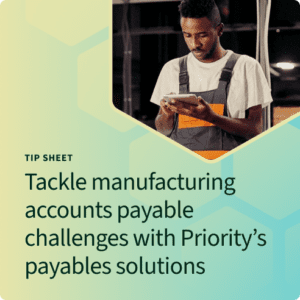
Understanding Pay-ins and Payouts for Business

Running a business means constantly navigating a financial balancing act, bringing in revenue through customer payments while disbursing funds to vendors, employees, and partners.
When that balance is disrupted, whether due to delayed pay-ins or inefficient payout processes, it can strain cash flow, stall operations, and damage key vendor relationships. By understanding how pay-ins and payouts work — and implementing the right accounts payable solutions to manage them — businesses can optimize liquidity and maintain financially agile operations.
What are pay-ins and payouts?
Pay-ins and payouts represent the movement of money in and out of an organization, respectively. Understanding how they function is essential for effective cash flow management.
Pay-ins defined
A pay-in is the receipt of funds into a business’s account. It includes payments from customers purchasing goods or services, capital contributions from investors, or deposits made by partners. Any transaction in which money flows into a business falls under pay-ins, which are crucial in maintaining liquidity and sustaining operations.
Common use cases for pay-ins
Organizations across different industries rely on pay-in processes tailored to their unique funding sources and cash flow needs. Common use cases include:
- E-commerce transactions: Online retailers need fast, secure digital payment processing to reduce friction at checkout. Many retailers support multiple payment methods, from buy now, pay later to digital wallets and credit cards.
- Subscription services: SaaS providers, streaming platforms, and other membership-based businesses depend on recurring pay-ins to maintain predictable revenue streams and minimize cash flow disruptions.
- Financial services: Banks, fintechs, financial management firms, and finance professionals frequently handle client deposits and facilitate seamless account funding and investment transactions.
- Marketplace platforms: Multi-vendor ecosystems like gig economy platforms or B2B marketplaces require efficient pay-in solutions to collect payments from buyers and allocate funds to sellers.
Payouts defined
A payout refers to the disbursement of funds from a business to an external party, such as a supplier, service provider, or employee. These transactions represent key expenses, whether it’s compensating staff, purchasing raw materials, or settling vendor invoices. Payouts are critical to keeping operations running and meeting financial obligations. When managed effectively, they can also support healthy cash flow and help businesses avoid late payments and fees.
Common use cases for payouts
Across industries, businesses rely on streamlined payout processes to fulfill financial responsibilities, maintain vendor and employee trust, and optimize cash flow. Common payout scenarios include:
- Vendor and supplier payments: Paying suppliers for goods and services is a fundamental part of daily operations. Most businesses must support a variety of payment methods — such as ACH transfers and virtual cards — to accommodate vendor preferences and ensure timely, accurate payments.
- Payroll processing: Prompt and reliable wage distribution is critical for workforce retention and productivity. Supporting direct deposits, pay cards, or alternative payroll solutions can help businesses reduce administrative burdens and increase employee satisfaction.
- Affiliate and partner payments: Many businesses compensate affiliates, influencers, or business partners for generating leads, driving sales, or meeting performance goals. These payouts must be scalable, trackable, and reliable to support growth and maintain transparency.
- Customer refunds: When a customer requests a refund, organizations need flexible payout options that ensure funds are returned quickly and accurately to preserve customer trust and satisfaction.
- Reimbursements: When reimbursing employees for business expenses, businesses need efficient systems that streamline approvals and disbursements.
How do pay-ins work?
The pay-in process begins when funds are initiated, whether through a customer purchase, subscription payment, or client deposit. Once the transaction is submitted, it’s routed through a secure payment processor that encrypts the data to protect sensitive information and ensure compliance with security standards.
The issuing bank then verifies the transaction, checking for available funds and assessing fraud risk before approving the transaction. Once the payment is authorized, the funds are deposited into the business’s account. From there, the business reconciles the transaction against invoices or sales data to ensure accurate recordkeeping and reporting.
How do payouts work?
The payout process begins when a business initiates a payment to a vendor, employee, or partner. Before the transaction is processed, internal systems verify payment details to ensure accuracy, security, and regulatory compliance. This step is crucial in preventing fraud and reducing the risk of errors.
Once approved, the payment is routed through banking networks or digital platforms using methods like virtual cards, ACH transfers, or direct deposits. A business can fund payments directly from its account or from a pre-funded balance depending on the system in place. While settlement times can vary with different payment methods, the payout is complete once the recipient’s account is credited.
How pay-ins benefit businesses
Efficient pay-in processes do more than just move money, accelerating revenue collection and creating opportunities for business growth. They also help unlock potential revenue by improving customer conversion and expanding market reach. By streamlining how you receive payments, you can reduce friction, boost sales, and build stronger relationships with your customers.
1. Reduce cart abandonment
A seamless payment experience encourages customers to follow through with their purchases instead of abandoning their carts — driving higher conversion rates and increasing revenue. On the backend, a streamlined pay-in process ensures incoming funds are processed and settled quickly and accurately, helping you maintain precise records and steady cash flow.
2. Strengthen market position
Payment convenience is a key differentiator in today’s competitive business landscape. Providing diverse and secure payment options helps you appeal to a wider range of customer preferences. When customers consistently enjoy smooth and reliable payment experiences, it enhances your reputation and encourages long-term loyalty.
3. Enable global expansion
Expanding into international markets requires a pay-in system that can handle cross-border transactions, support multiple currencies, and ensure compliance with varying regulations. By accepting digital wallets, local currencies, and alternative options such as bank transfers, you can ensure a seamless buying experience for your customers — wherever they are and however they prefer to pay.
How payouts benefit businesses
Want to maintain healthy cash flow and keep your business operations running smoothly? Optimizing payouts is key. Offering flexible, efficient, and secure payout options can help you build stronger ties with vendors and partners while gaining greater visibility into outgoing payments.
1. Support multiple payment options
Payment flexibility is essential for maintaining relationships with vendors, contractors, and other stakeholders. Offering multiple payout options gives recipients the freedom to choose the method that works best for them. Additionally, payout flexibility can benefit your company directly as well. Some modern payment solutions allow you to pay any vendor with a credit card, even if they don’t normally accept card payments. This enables you to extend cash flow and take advantage of rewards as an added bonus.
2. Enable faster payment processing
Slow, manual payment processes can lead to missed deadlines, strained vendor relationships, and avoidable administrative costs. B2B AP automation solutions enable faster payment processing by eliminating manual data entry, reducing errors, and streamlining approval workflows.
As a result, you can pay vendors on time consistently and free up internal teams to focus on innovation and growth. Consistent, timely payments can also help you strengthen vendor relationships and give you leverage to negotiate better terms moving forward.
3. Simplify payee onboarding
Managing multiple payees can be complex, especially for businesses that rely on a large network of contractors, freelancers, merchants, or third-party suppliers. Without the right systems in place, onboarding payees becomes a time-consuming and error-prone process.
Automated payout solutions simplify onboarding by standardizing data collection and streamlining identity verification, ultimately reducing back-and-forth with vendors. This reduces administrative workload and accelerates the time it takes to get new payees set up and paid.
4. Streamline payment operations
An optimized payout process reduces complexity while minimizing errors, cutting processing costs, and supporting compliance with tax reporting requirements and other financial regulations. It’s also an important component of broader tax strategies that can boost your business’s efficiency during peak seasons
Centralized payment management tools offer real-time visibility into payment status and cash flow, giving you greater transparency and control over outgoing payments. By automating and consolidating payout workflows, you can reduce administrative overhead and lower the risk of fraud.
Optimize your business’s pay-ins and payouts with Priority
A well-structured pay-in and payout strategy is critical for maintaining healthy cash flow and driving long-term business growth. That starts with adopting the right technology to support fast, secure, and compliant payment operations.
Priority’s suite of payables solutions helps your business manage incoming and outgoing payments with confidence and control — no matter your payment volume or complexity. From flexible vendor disbursements and automated approval workflows to seamless customer payment acceptance, Priority streamlines your entire payment ecosystem.
Get in touch with Priority to optimize your pay-ins and payouts today.










